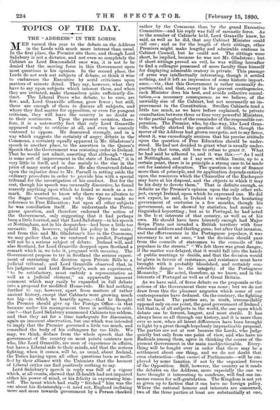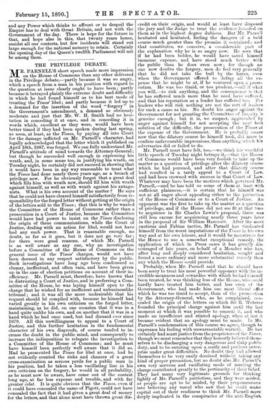TOPICS OF THE DAY • THE " ADDRESS " IN
THE LORDS.
MEN turned this year to the debate on the Address in the Lords with much more interest than usual. In the first place, the Premier sits there, and though Lord Salisbury is not a dictator, and not even so completely the Cabinet as Lord Beaconsfield once was, it is not to be denied that the moving force in this Government upon most questions is his opinion. In the second place, the Lords do not seek out subjects of debate, or think it wise to embarrass the Executive by acrid criticisms upon matters of minute detail. They say, however, what they have to say upon subjects which interest them, and when they are irritated, make themselves quite sufficiently dis- tinct. The Liberal Peers who debate, to be sure, are few, and, Lord Granville affirms, grow fewer ; but still, there are enough of them to discuss all subjects, and where they find matter for opposition, or even for pungent criticism, they will leave the country in no doubt as to their sentiments. Upon the present occasion, there- fore, it is a noteworthy fact that only Lord Granville appeared ready to criticise at all, and even he scarcely ventured to oppose. He demurred strongly, and in a way which suggests the certainty of angry debate in the Commons, a certainty equally apparent in Mr. Gladstone's speech in another place, to the assertion in the Queen's Speech that the Government was restoring order in Ireland. That he would not admit, asserting that although "there is some sort of improvement in the state of Ireland," it is very little in itself, and is due mainly to the rise in the price of many sorts of produce. He also threatened debate upon the injustice done to Mr. Parnell in setting aside the ordinary procedure in order to provide him with a special tribunal for the investigation of his conduct. But for the rest, though his speech was unusually discursive, he found scarcely anything upon which to found so much as a re- mark. He wanted to know why there was no allusion to the Sugar Convention, and why the Queen made no reference to Free Education; but upon all other subjects he was conciliation itself. He understands the Portu- guese question, and therefore endorsed the action of the Government, only suggesting that it had perhaps been a little hurried, and that Lord Salisbury—in his speech at Nottingham, not in his despatches—had been a little too sarcastic. He, however, upheld his policy in the main ; and from this and Mr. Gladstone's line in the Commons, we may gather that, as we ventured to predict, Portugal will not be a serious subject of debate. Ireland will, and also Scotland, for Lord Granville dropped upon Scotland. a remark which is, we take it, pregnant with meaning. The Government propose to try in Scotland the serious experi- ment of entrusting the decision upon Private Bills to a judicial tribunal ; and Lord Granville observed that, in his judgment and Lord Rosebery's, such an experiment, "to be satisfactory, must embody a representative as well as a judicial element," an apparently innocent comment which may easily be expanded in full debate into a proposal for modified Home-rule. He had nothing further to say, however, apart from matters of rather ancient history, except that Cabinets were growing much too big—in which we heartily agree,—that he thought the Premier should give up the Foreign Office—is that because under his management there is nothing to criti- cise ?—that Lord Salisbury summoned Cabinets too seldom, and that they sat for a time inadequate for discussion, again an innocent observation, but one which was intended to imply that the Premier governed a little too much, and consulted the body of his colleagues far too little. We may, we think, deduce from the whole speech that the government of the country on most points contents men who, like Lord Granville, are men of experience in affairs, but have a Liberal side to their minds, and that the serious fighting, when it comes, will be, as usual, about Ireland, the Tories having upon all other questions been so molli- fied by their alliance with the Unionists that the keenest of Liberal critics can find positively nothing to say. Lord Salisbury's speech in reply was full of a vigour which, at all events, showed that ill-health had not impaired either his power of mind, or his felicity in expressing him- self. The taunt which had really " fetched " him was the one about his dictatorship—it need not, England inclining more and more towards government by a Person checked rather by the Commons than by the grand Executive Committee—and his reply was full of sarcastic force. As to the number of Cabinets held, Lord Granville knew, he said, as well as he did, that any Cabinet Minister could call one ; and as for the length of their sittings, other Premiers might make lengthy and admirable orations in Cabinet Council, but he could not. The sittings were short, he implied, because he was not Mr. Gladstone ; but if short sittings proved an evil, he was willing hereafter to find a colleague possessed of more faculty than himself for displaying admirable oratory in private. This passage of arms was intellectually interesting, though it settled nothing, and it left an impression of some historic import- ance,—viz., that this Government is rather unusually de- partmental, and that, except in the gravest contingencies, each Minister does his best, and avoids collective consul- tation,—a necessary consequence, as we believe, of the unwieldy size of the Cabinet, but not necessarily an im- provement in the Constitution. Swollen Cabinets tend a little too much, as we have before explained, to private consultation between three or four very powerful Ministers, to the partial neglect of the remainder of the responsible cor- poration. The Premier, who, by-the-way, like Lord Gran- ville, wholly shirked the question of tithes, though the mover of the Address had grown energetic, not to say fierce, about it, was exceedingly anxious that his precise attitude upon the question of Free Education should be under- stood. He had not decided to grant what is usually under- stood by that term, still less to refuse to grant it. What he had said he adhered to, and it was this :—" As I said at Nottingham, and as I say now, within limits, up to a certain point, there is in principle a strong case to be made out for assisted education. The question is one of finance more than of principle, and its application depends entirely upon the resources which the Chancellor of the Exchequer may have at his disposal, and. the objects to which it may be his duty to devote them." That is definite enough, as definite as the Premier's opinion upon the only other sub- ject, except Ireland, upon which he expressed one. He did not expect, he said, in Ireland to remedy the hesitating government of centuries in a few months, though his government, as he showed by statistics, had nearly ex- tinguished boycotting ; but as to Portugal, he had acted in the best interests of that country, as well as of his own. He should have been leisurely enough had Major Serpa Pinto not invaded a British territory with four thousand soldiers and Gatling guns; but after that invasion, and the effervescence in the Portuguese populace, it was necessary to act at once, "lest the decision should pass from the councils of statesmen to the councils of the populace in the streets." "We felt there was great danger, if the matter was delayed, that it would fall into the hands of public meetings to decide, and that the decision would be given in favour of resistance, and resistance must have brought with it probably bloodshed, and certainly con- siderable danger to the integrity of the Portuguese Monarchy." He acted, therefore, as we know, and in the interests of Portugal as well as of Great Britain.
As we have said, of fierce debate on the proposals or the actions of the Government there was none ; but we do not draw from this the pleasant auguries which some of our contemporaries have deduced. On the contrary, the fighting will be hard. The parties are, in truth, irreconcilably opposed only on one point, the good government of Ireland ; but that is, of all subjects in the world, the one upon which debate can be fiercest, longest, and most sterile. It has always been so all through our history, and it is more than ever so now, when all latent differences have been brought to light by a great though hopelessly impracticable proposal. The parties are not at rest because the Lords, who judge quietly but only from one point of view, and who have no Radicals among them, agree in thinking the course of the present Government in the main unobjectionable. Every- thing will be fought over in order that there may be a, settlement about one thing, and we do not doubt that even obstruction—that curari of Parliaments—will be em- ployed by some fanatics, if not by the organised forces of the Opposition. Still, however, the country as it reads the debates on the Address, more especially the one we have thought it interesting to condense, will find one im- mense reason for self-gratulation. The Kingdom is not yet so given up to faction that it can have no foreign policy. Where the national honour and interests are concerned, two of the three parties at least are substantially at one, and any Power which thinks to affront or to despoil the Empire has to deal with Great Britain, and not with the Government of the day. There is hope for the future in that, and hope also in this, that twenty years hence, amidst all our contests, but few incidents will stand out large enough for the national memory to retain. Certainly the opening day of the Queen's twelfth Parliament will not be among them.



































 Previous page
Previous page